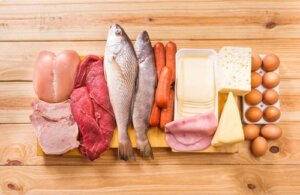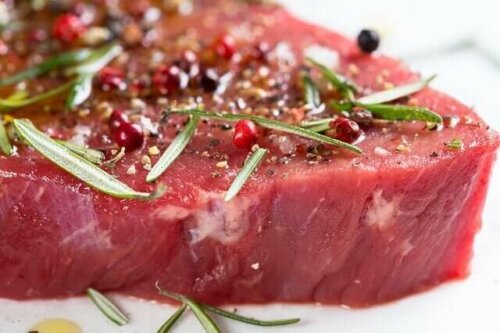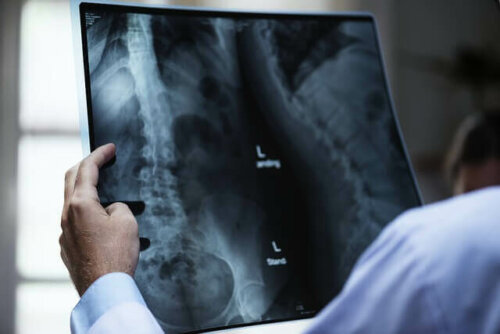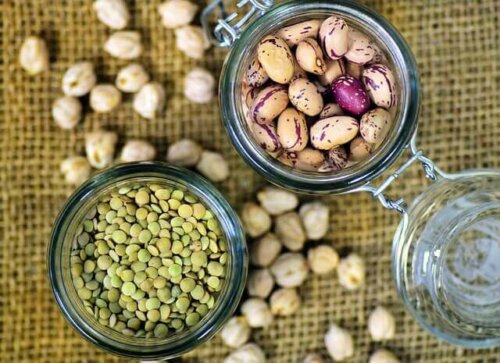The Risks of Adhering to a High-Protein Diet


Written and verified by the nutritionist Minerva Camero Albella
There are currently many eating fads out there and you must know that most of them are bad for your health; such is the case with a high-protein diet. Some of them carry multiple health risks, in fact. This is the case of the high-protein diet — also known as the protein diet. It’s merely an eating model based on the consumption of protein-rich goods mainly — meat, for example.
Just as some people advocate the consumption of more vegetables, fruit, whole grains, etc., there are those who vouch for the consumption of high-protein food, above the rest. The problem with this kind of diet is that it isn’t balanced. It doesn’t provide you with all of the nutrients your body needs to perform its functions accurately and keep you healthy.
The possible risks of a high-protein diet
Many people truly often believe that eating a high-protein diet is healthy but it isn’t. Excessive intake of protein can affect you in several ways.
For instance, you fail to include other nurturing food groups when you only focus on consuming protein. Be aware that all nutrients are equally necessary for optimal body function.

Thus, you must take into account some basic points in order to be able to adhere to a high-protein diet:
- Be familiar with the types of food that are high in protein. This is because not all of them are of animal origin like meat, fish, chicken, cheese, and milk. Most legumes and nuts and even some vegetables have a high protein content as well.
- Determine your need for protein and don’t exceed your daily requirements. The established consumption is 1.2 g/kg/proteins a day and it’s enough to cover the nutritional requirements of a “normal” adult.
- Balance is key so don’t limit your diet to animal protein. Instead, include protein of vegetable origin and mix it with carbs to not only obtain a good amount of protein, but fiber as well.
The negative effects of a high-protein diet

Excessive consumption of protein could have a negative impact on your health (we’ll discuss it below). Thus, you must consider the risks of a given diet before adopting it. In addition, you must always consult a doctor and resolve any concerns that may arise.
Note that the latest research didn’t find a direct relationship between high protein consumption and organic damage. In fact, these types of diets are mainly harmful when people skip other important nutrients so as to increase protein intake.
Kidney overload
One of the risks of eating a high-protein diet is that it could damage the kidneys, although recent studies didn’t find strong evidence for this. It’s mainly that these types of food make them work twice as hard.
In other words, our kidneys work extra hard when we eat too much protein (these organs remove the waste from protein intake). Thus, maintaining this diet over a long period of time could be a risk factor for people with a susceptibility to kidney disease.
Find out what are The Consequences of a Calcium Deficiency
Increased risk of nutritional imbalance
You must be aware that the nutritional balance of your diet is essential before you adopt this type of diet. Thus, you can’t just eat animal protein without including food rich in fiber. In fact, you could considerably deplete your carbs and fall into a state of ketogenesis.
As you can see, eating proteins isn’t bad at all, just maintain an adequate intake of fiber. Its regular consumption is essential for proper intestinal health — according to research published in the Central European Journal of Public Health.
Things to consider before adopting a high-protein diet

- Be sure to be in good health, in general
- Opt for semi-skimmed or skimmed cheeses and dairy products preferably
- Avoid consumption of overly-processed proteins such as industrial sausages and canned goods, among others
- Maintain proper levels of hydration by drinking plenty of water throughout the day
- Consume more vegetable protein from legumes, vegetables, and nuts
Finally, consult your doctor before starting a high-protein diet and follow their instructions. Also, keep in mind the points we made above and don’t risk your health. Remember, these diets may seem rather attractive but this is only from an advertising perspective. They don’t really have the health benefits they claim to have.
All cited sources were thoroughly reviewed by our team to ensure their quality, reliability, currency, and validity. The bibliography of this article was considered reliable and of academic or scientific accuracy.
- Cao JJ., High Dietary protein intake and protein related acid load on bone health. Curr Osteroporos Rep, 2017. 15 (6): 571-576.
- Kamper AL., Strandgaard S., Long term effects of high protein diets on renal function. Annu Rev Nutr, 2017. 37: 347-369.
- Hijova E., Bertkova I., Stofilova J., Dietary fibre as prebiotics in nutrition. Cent Eur J Public Health, 2019. 27 (3): 251-255.
This text is provided for informational purposes only and does not replace consultation with a professional. If in doubt, consult your specialist.








